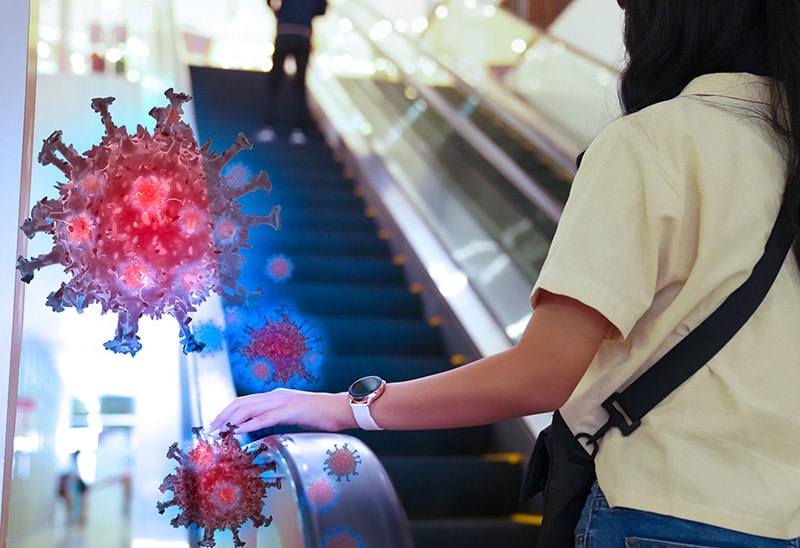07.10.2021/ THE WORLD FINANCIAL REVIEW – Even during a viral pandemic, contaminated surfaces need not be scary. A host of companies now offer innovative solutions to prevent the spread of Covid-19 on everyday objects.
As the health experts have made clear, the predominant infection pathway for coronavirus is through person-to-person contact. This occurs mainly via aerosol droplets released when an infected individual coughs or sneezes. Social distancing, wearing face masks, and the ventilation of indoor spaces are vital mitigation policies.
But the next most prevalent route for infection is through surface contamination. And here technology companies have made some solid advances.
The first step is to touch surfaces less
The Indian technology company Techmax Solution has developed a touchless, plug-and-play control panel for elevators.
High-touch surfaces are of particular concern, but this novel solution uses motion sensors to interact with the elevator’s original controls, completely removing any need to make physical contact. The device can be installed in virtually any model of elevator, and comes in a range of sizes, depending on the number of controls needed.
The company says that its “Sparshless” panel means that not only are people at reduced risk of spreading or contracting the virus, but there is also less need to disinfect elevators. For large hotels, apartment buildings, and office complexes, this greatly reduces the amount of work that cleaning staff are required to do.
Bioguard, the durable virucidal and anti-bacterial treatment fending off coronavirus
There are certain kinds of objects, however, with which contact cannot be avoided. Banknotes are one example.
Despite the often-heard digital payments narrative, cash is still readily used around the world. In fact, cash demand has risen during the pandemic. Of course, so too did concern about cash as a transmitter of coronavirus.
Scientists have subsequently refuted claims that cash was a strong contamination risk, encouraging the public to think more about other everyday surfaces. And yet, confidence in cash was temporarily shaken as a result of the unfounded concerns.
Fortunately, an answer to this problem has existed since well before the less-than-novel coronavirus emerged. Bioguard is a virucide developed 15 years ago by French security printer Oberthur Fiduciaire that is now updated jointly with its subsidiary Bioguard & Co.
“Well before the H5N1 crisis [bird flu], our teams developed a treatment that was constantly tested and improved in order to make the surface of banknotes ‘hostile’ to bacteria, viruses and other microscopic fungi – without having any negative impact on humans,” explains the company’s general manager, Etienne Couëlle.
An independent laboratory tested Bioguard treatment when the pandemic emerged and found that it was particularly effective against coronaviruses. The tested samples showed that the concentration of the human coronavirus OC43 was reduced by a factor 100 via Bioguard.
The solution is applied to banknotes during printing or afterwards as a post-print varnish.
Most promisingly of all, Bioguard is versatile enough that it can be applied to many other everyday objects and surfaces, rendering them durably inhospitable to coronavirus too.
In public transport, Bioguard could soon be protecting handrails and seating, reducing the available space for viruses to survive on trains and buses. There are also possibilities for applications in offices, restaurants and bars, protecting printer paper, menus, tables, and bar tops. Even in schools, habitable surfaces for coronavirus could be reduced if Bioguard were applied to classrooms, to teaching tools, and to playground equipment.
As it is already in use as a verified and safe product, the shift of this ready-to-use solution towards other applications could happen quickly. This gives Bioguard genuine potential to protect people from surface contamination globally.
Virus-killing robots
Another proven tool in the fight against coronavirus is the autonomous LightStrike6 sanitation robot. The company responsible for the Germ-Zapping Robot is Xenex. It has been operating for more than a decade, but during the pandemic these patented ultra-violet emitting disinfection machines proved their strength.
“Being able to help healthcare facilities and other organizations safely and effectively destroy viruses and bacteria that can lurk in their facilities is important and not something we take lightly,” says Irene Hahn, senior vice president of sales and marketing for Xenex.
LightStrike robots were used in hundreds of healthcare facilities prior to the health crisis, but as a result of the robot’s speed and efficacy against coronavirus, they are now deployed in office buildings, airports, schools, hotels, sports facilities, events spaces, and other places where contamination and transmission are a concern.
Decontaminating face masks with heat
The pandemic has also created opportunities for companies to develop previously unimaginable products. In Israel, researchers have developed reusable face masks that not only sanitise themselves, they do so with heat generated by connecting a simple USB port to a phone charger.
The power source heats an inner layer of carbon fibres to 70°C. It then takes about 30 minutes for the disinfection process to take place. The researchers hope the invention can alleviate the mask shortage during and after the Covid-19 pandemic.
While innovation might not always offer a silver bullet to humanity’s problems, clearly it has massive capacity to remove roadblocks. With solutions available to solve the conundrum of surface contamination, the path is now cleared for tackling other Covid-19 challenges.






